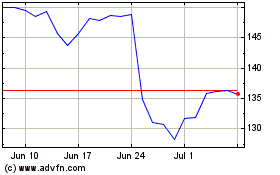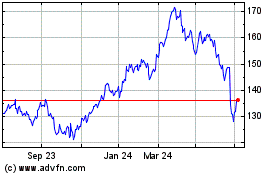Airbus Looks to End Trade Dispute With U.S. by Forgoing Some Government Support -- Update
July 24 2020 - 7:41AM
Dow Jones News
By Dan Michaels and Pietro Lombardi
Airbus SE has agreed with the Spanish and French governments to
change some financial-support agreements in an attempt to bring an
end to a yearslong trade dispute with the U.S.
The European plane maker said Friday that it thought the move
would put it in full compliance with World Trade Organization
guidelines and remove justification for U.S. tariffs.
The U.S. has for years argued that Airbus benefits from European
government subsidies that have harmed the U.S. aerospace industry
and its workers. Last year, it won authorization from the WTO to
impose tariffs in response, and swiftly introduced levies on $7.5
billion worth of aircraft, food products like cheese and other
goods from the European Union.
Earlier this year it said it would increase tariffs on aircraft
coming from the EU while the dispute remained unsolved.
Airbus said Friday it wanted to end the dispute, which it said
was adding to a difficult environment amid the coronavirus
pandemic. European industries targeted by U.S. tariffs in the
dispute have pressed Airbus and their governments to settle the
fight because the new levies are compounding economic pain from the
pandemic.
Airbus has agreed to change a so-called Repayable Launch
Investment -- essentially government subsidized loans to help
develop and produce new aircraft -- related to its A350 jetliner to
abide by parameters considered appropriate by the WTO.
Under the changes announced Friday, Airbus will increase the
payment it makes to governments on each A350 delivered to a
customer. The increase will bring the interest rates Airbus pays on
its government loans to market rates stipulated by the WTO, up from
subsidized rates.
Friday's announcements regarding France and Spain follows a
similar move with Germany in December, when Airbus also fully
repaid U.K. government loans for the A350.
Airbus Chief Executive Guillaume Faury said the change
demonstrates "that Airbus has left no stone unturned to find a way
towards a solution."
The EU said in a statement that the move made "a strong case for
a rapid settlement" of the dispute.
U.S. officials had no immediate comment. Washington didn't
respond officially following the European moves in December. The
WTO hasn't assessed those moves because operations in its appellate
body have been blocked by a shortage of officials, which in turn is
largely due to dissatisfaction in the U.S. with how the body has
functioned in recent years.
It remains unclear whether the European move will satisfy U.S.
negotiators. WTO disputes, including previous fights over aviation,
have gone through multiple and protracted rounds of concessions
that one side said brought compliance but the other rejected.
The dispute over aircraft subsidies dating back to 2004 and has
become part of the Trump administration's trade negotiations with
Europe. The two sides have been in formal negotiations since 2018
over a range of trade issues but have made little progress.
The WTO is expected to rule later this year on a related case
brought by the EU against U.S. subsidies of Boeing. At that point,
the EU could be authorized to strike back with tariffs of its
own.
French Finance Minister Bruno Le Maire said Friday that
Europeans want to discuss with the U.S. how to improve
international rules for aircraft financing.
"But if the United States continues to refuse an amicable
negotiation, the European Union will have no choice but to adopt
tariff sanctions against American products, when the WTO will allow
us to do so in a few weeks in the Boeing litigation," he said.
Noemie Bisserbe contributed to this article.
Write to Dan Michaels at dan.michaels@wsj.com and Pietro
Lombardi at Pietro.Lombardi@dowjones.com
(END) Dow Jones Newswires
July 24, 2020 07:26 ET (11:26 GMT)
Copyright (c) 2020 Dow Jones & Company, Inc.
Airbus (EU:AIR)
Historical Stock Chart
From Mar 2024 to Apr 2024

Airbus (EU:AIR)
Historical Stock Chart
From Apr 2023 to Apr 2024
